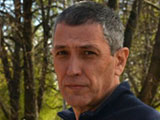Alien, the Eighth Passenger
by Israel Centeno / August 28, 2012 / No comments
Has Venezuela been abducted by its own policies?

To some, opposition candidate Henrique Capriles represents change for Venezuela. Others doubt how much Venezuela's policies will ever change. Photo: Globovisión
I have a theory that the Venezuelan state (the oldest and most powerful “populist petrostate” in history, as Ibsen Martínez describes it, has an autonomous life-form deeply rooted in its absolute ownership over the treasure in its subsoil. The State alone administers and distributes oil revenues. The people are not the ones giving themselves constitutions and sovereign governments; it’s the state, transformed into an “Alien,” that gives itself people to govern and people who govern without independence.

- From his lonely watch post Albert Camus asked who among us has not experienced exile yet still managed to preserve a spark of fire in their soul. “We’re all alone,” Natalia Sedova cried in exile on hearing of her husband Leon Trotsky’s affair with Frida Kahlo. In his novel Night Watch, Stephen Koch follows the incestuous love affair of David and Harriet, wealthy siblings watching the world from their solitary exile. Koch’s writing, Camus’s theories, and Trotsky’s affair all come back to exile and lead me to reflect on the human condition. From my own vantage point, my Night Watch, I will reflect on my questions of exile, writing, and the human condition.

- Israel Centeno was born in 1958 in Caracas, Venezuela, and currently lives in Pittsburgh as a Writer-in-Residence with City of Asylum/Pittsburgh. He writes both novels and short stories, and also works as an editor and professor of literature. He has published nine books in Venezuela and three in Spain.
The Venezuelan state has reinvented the forms and names of oil revenue-redistributing populism and has distorted the models it lays its hands on. The state, abducted by the Eighth Passenger* at the moment when it was debating how to find a solution to the contradiction between statism and economic democracy, ended up suffocating forty years of democratic institutionalism. The Eighth Passenger was hungry and, to satisfy that hunger, grew with a “revolutionary process” led by a military man. His new government brought a hybrid rhetoric combining fascist nationalism, the old populism of Latin American democracies, and Stalinism.
After fourteen years in practice, this government’s “21st-century socialism” looks old, corrupt, and exhausted. Now the election of a civilian candidate to the presidency seems plausible. However, the opposition candidate doesn’t dare focus his discourse on the need to get rid of the Alien and put redistributive populism—which generates corruption—to the side. He fears being categorized as the liberal right-wing. In Venezuela, as Ibsen Martínez explains, even right-wing supporters condemn capitalism and have signed up in favour of a social state subject to the rule of law. In my country it is taboo to speak about capitalism—even to suggest it. Even multinationals call themselves socialists.
Still the opposition candidate tries to galvanize all political parties and awaken people’s desires, not only with the promise of replacing Hugo Chávez, but also by improving on Chávez’s plans for distributing oil revenues. But in the candidate’s speech there is no sign, at least openly, of a change of model, only a suggestion of changing the model’s operator and the way in which it is operated. The opposition candidate is, perhaps, trying to earn interest without losing his political capital.
In Venezuela the PetroState continues—multi-headed, clientelistic, mafioso, corrupting, and all-powerful—with a life of its own, up above Chávez and the rest of reality.
Currently, Venezuelans are busy resolving their first dilemma: Getting rid of a corrupt, authoritarian, military leadership and returning power to civilian governance. This could be the first step on the long and eventful road toward political, economic, and social modernization—a light, effective reinstitutionalization of Venezuela. But it can also mean that after losing political will, we run the risk of allowing a new arrangement of the Hydra, the Eighth Passenger, “the most powerful populist petrostate in the world.”
*The Ridley Scott film, originally named Alien, was named Alien, the Eighth Passenger in Spanish
Translation: Alex Higson




